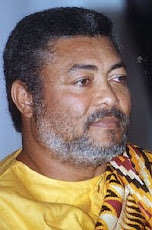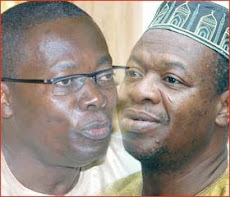The Minority in Parliament has said the incorporation of Agyapa as an offshore company in Jersey, in the Channel Islands, a known tax haven, “is worrying”, adding: “Tax havens are generally known for their lack of transparency in matters of corporate governance such as disclosure of the beneficial ownership of the shares of companies”.
At a press conference on Tuesday, 1 August 2020, Minority Leader Haruna Iddrisu said: “Tax havens are susceptible to money laundering and, thus, elevate the risk of Ghana being listed as a money-laundering jurisdiction by international bodies such as the European Union and the United Nations”.
Mr Iddrisu said: “Ghanaians will recall that in May 2020, the European Union placed Ghana on its Anti-Money Laundering List (AML) but deferred the implementation date to October 1, 2020, due to the Covid-19 pandemic.
“By setting up a sovereign wealth fund in a tax haven, the Government of the NPP significantly elevates the risk of Ghana being considered as a money-laundering jurisdiction.
“This is because individuals and businesses use tax havens such as Jersey to hide their income and wealth so as to avoid payment of taxes and general regulatory scrutiny of their business deals.
“The European Union, the OECD and the United Nations use evidence of these offshore deals to rate countries on the effectiveness of their anti-money laundering regimes, including laws, regulations, policies, and other governmental actions”, he noted.
Read the Minority's full statement below:
NATIONAL SECRETARIAT
P.O BOX AN 5825 ACCRA-NORTH, GHANA
MINORITY PRESS STATEMENT ON THE ESTABLISHMENT OF AGYAPA ROYALTIES READ BY HON. HARUNA IDDRISSU, MINORITY LEADER OF PARLIAMENT
Colleague MP’s, Invited guests, Ladies and gentlemen of the media, Good Morning. Thank you for responding to our call, once again, at such a short notice.
INTRODUCTION
1. Ladies and gentlemen of the press, you will recall that on Friday, August 14, 2020, the last day of the second meeting of the fourth (4th) session of the 7th Parliament, President Akufo-Addo caused seven (7) agreements relating to the Minerals Income Investment Fund (“MIIF”) to be laid before Parliament for approval.
2. The Agreements seek to mortgage Ghana’s future mineral royalties and long term national assets in perpetuity without any regard to its implication on future national revenue streams. Through this transaction, the Akufo-Addo government intends to use a Special Purpose Vehicle (SPV), Agyapa Royalties, incorporated as an offshore company in Jersey, in the Channel Islands, a known tax haven, in exchange for an upfront amount of USD500 million, under the Mineral Development Fund Act, 2018 (Act 978) and its amendment Act, which strangely, was yet to be assented to by the President in accordance with article 106 of the 1992 Constitution to make it law.
The Government of Ghana will own 51 per cent of the shares of the company and the remaining 49 per cent floated on the London Stock Exchange.
3. Let me state emphatically, that Members of Parliament had less than 4 hours to scrutinise these agreements, and ascertain the extent to which they would enhance the welfare of the people of Ghana and in particular its ramifications on national revenue into the future. Paradoxically, the Akufo-Addo government claims to have used two (2) years to prepare these agreements and yet, the people’s representatives in Parliament were required to peruse and approve same in less than four (4) hours.
4. The NDC Minority in Parliament, took a strong position in the national interest that the indecent haste with which these high-stakes agreements were being rushed through the parliamentary approval process does not augur well for the important exercise of Parliamentary oversight on an issue as critical as the mortgaging of the gold royalties of the country in perpetuity.
5. As representatives of the people of Ghana, it is our duty to ensure that such agreements meet key legal and constitutional requirements before approval. The Minority, therefore, requested for the full complement of requisite documents to guide and facilitate thorough scrutiny and due diligence of the proposed deal in accordance with article 185 of the 1992 constitution.
6. Key amongst these requisite documents were:
• the prospectus for the eventual sale of shares in Agyapa through an Initial Public Offering (IPO) on the London Stock Exchange. The prospectus would contain more important details of the deal such as projected cash flows, underlying assumptions and the dividend policy.
• incorporation details for the SPV, Agyapa Royalties
• detailed justification for the choice of Jersey, a known tax haven
• fiscal impact assessment
7. Ladies and gentlemen, to our utter dismay, the Minister of Finance refused to make these key documents available to us on the excuse that they were in draft form and for reasons of confidentiality, could not to be shared even with the elected representatives of the people of Ghana. This decision of the Finance Minister is in clear violation of Article 181(5) of the Constitution which requires that such documents together with the agreements be laid before Parliament for approval.
8. As a direct consequence of this concealment of vital information from the people of Ghana, the debate on the floor of Parliament was extremely acrimonious, and eventually, the Members of the Minority in Parliament were compelled to stage a walkout as a clear statement of our intent to protect the national interest at all cost.
9. Ladies and gentlemen, the Minority in Parliament would like to state unequivocally that a future NDC government will not honour the terms of this unconscionable agreement as described by the current Attorney-General. Pursuant to this, we wish to state as follows:
a) The NDC is of the strong view that the decision to mortgage Ghana’s future mineral royalties in perpetuity is grossly inimical to the interest of the people of Ghana and runs contrary to the constitutional imperative that governmental power be exercised for the welfare of the people of Ghana. This deal fails to enhance public welfare. Our analysis shows clearly that Ghana stands to lose billions of United States Dollars in revenue as a consequence of this illegal transaction.
This is because annual gold royalties from the mining sector amount to about USD200 Million on the average. It makes no economic sense, therefore, to mortgage these receivables to an opaque Special Purpose Vehicle (SPV) in exchange for an upfront amount of just USD500 million.
b) To ensure the deal meets best international practices, the Minority demanded that Parliament be furnished with periodic reports on the activities of the SPV in the spirit of accountability and transparency. These legitimate demands were vehemently opposed by the government and the majority side in parliament.
c) Minority’s specific concerns on the offshore entity (Agyapa Royalties)
i. The incorporation of Agyapa as an offshore company in Jersey, in the Channel Islands, a known tax haven, is worrying. Tax havens are generally known for their lack of transparency in matters of corporate governance such as disclosure of the beneficial ownership of the shares of companies.
ii. Tax havens are susceptible to money laundering and thus elevate the risk of Ghana being listed as a money-laundering jurisdiction by international bodies such as the European Union and the United Nations.
iii. Ghanaians will recall that in May 2020, the European Union placed Ghana on its Anti-Money Laundering List (AML) but deferred the implementation date to October 1, 2020, due to the Covid-19 pandemic.
By setting up a sovereign wealth fund in a tax haven, the Government of the NPP significantly elevates the risk of Ghana being considered as a money-laundering jurisdiction.
This is because individuals and businesses use tax havens such as Jersey to hide their income and wealth so as to avoid payment of taxes and general regulatory scrutiny of their business deals.
iv. The European Union, the OECD and the United Nations use evidence of these offshore deals to rate countries on the effectiveness of their anti-money laundering regimes, including laws, regulations, policies, and other governmental actions.
d) Minority’s concerns on an off-budget transaction. The deal is intended to monetise gold royalties to fund the Budget and ought to have been reflected in the Budget Statements tabled for approval and subsequently enacted in the various Appropriation Acts for the 2020 Fiscal Year. The deal did not reflect in the Budget Statement for the 2020 Fiscal Year.
e) In reviewing the 2020 Substantive and Supplementary Budgets, the Government did not disclose any of the following fiscal measures to Parliament.
i. That the MIIF will substantively replace the Mineral Development Fund (MDF) from 2020, as the Government noted;
ii. There was no policy on how current MDF beneficiaries, including traditional authorities, will continue to get their share of mineral royalties; and
iii. There were no explicit provisions in Financing (or borrowing) and Public Debt in the Budgets from 2020 onwards, besides the International Monetary Fund (IMF) COVID Loan.
iv. The Government showed the mineral (gold) monetisation “explicitly” in December 2019 as a potential source of financing the Budget in the IMF Article IV Report—but did not do so in the 2019 Budget approved by Parliament in the same December 2020.
v. In March 2020, in applying for the IMF COVID-19 Loan (approved in May 2020), GOG took the opposite step in excluding the minerals (gold) royalty monetisation from the financing sources.
vi. The Government also excluded mineral royalty monetization from its COVID-19 Statements to Parliament in March and May as well as Supplementary Budget in July 2020.
f) Minority’s Concerns on Family and Friends transaction. This transaction is yet another classical case of family-and-friends transaction. The good people of this country need to know the following. Ghanaians are demanding answers.
i. We need to know the procurement processes used in selecting Africa Legal Associates (ALA) as legal advisors. ALA is owned by Gabby Otchere Darko, the cousin of both President Akufo-Addo and Ken Ofori Atta, the Finance Minister.
ii. We also need to know the cost of the transaction and how much has been paid to the lawyers, and brokers including Gabby's company.
iii. We need to know whether the amount of money paid to Gabby's company was at arm’s length.
iv. Considering Gabby's relationship with the finance minister and the president we also need to satisfy ourselves that he did not use his influence with decision-makers to secure this lucrative deal.
v. Why the choice of Kofi Osafo Marfo, son of Senior Minister, Yaw Osafo Marfo? Was he subjected to a credible international competitive selection process?
vi. What considerations went into determining the remuneration for Mr Osafo-Maafo's son? Did his father (the senior minister) influence the selection process? Ghanaians deserve to know.
vii. Why is he, together with other board members guaranteed employment for the foreseeable future irrespective of their output?
g) Minority’s concerns on conflict of interest. Gabby Otchere-Darko's law firm advising on this shady Agyapa deal is similar to the objectionable practice of Databank serving as a book-runner on government bonds or co-manager of Eurobonds. All these transactions are motivated by fees which are certain and paid upfront.
These fees partly explain the rapid growth in public debt. A key driver of the ballooning public debt under the Akufo-Addo government is the fees earned by the Finance Minister’s company, Databank.
The selection of Databank Brokerage Limited as a book-runner means that Databank profits every time the Government issues bonds on the domestic market.
The actual commission is not based on the debt stock but on gross issuance (including refinancing) on the domestic market which in 2019 alone amounted to whopping GHS64.0 billion.
Since 2017, Databank has also been a Co-Manager of Ghana’s Eurobond transactions. During this period, Ghana has issued $5 billion in Eurobonds, with commissions and fees paid to Lead Managers and Co-Managers.
It is difficult to see how the Minister can be restrained from borrowing for Ghana if his firm benefits on a commission each time the government issues domestic bonds or Eurobonds.
Indeed, in 2018 when CHRAJ investigated conflict of interest allegations against the Minister of Finance in the matter of the issuance of $2.25 billion of bonds, the Commission observed that the respondent is either a director, the former director, the shareholder, or beneficial owner, of several companies whose objects relate to the securities market sector. The companies were Databank and EGL.
As such, Respondent’s interests in the growth and wellbeing of those companies, have the potential to conflict with the interests of the state in relation to the securities market such as the issuance of bonds.
h) Minority’s concerns on the secrecy of information on the company (Agyapa).
i. The Government has failed to give us information on the value of the company.
ii. We were not given information on how they arrived at the value of the company.
iii. We were also not given cash flow forecast for the duration of the project and its assumptions.
iv. Neither do we have the prospectus for us to know the cost of the transaction. We are reliably informed that they have spent $5 million even though the minister of finance claimed to have spent about $2 million as fees.
i) Minority’s concerns on Fiscal issues.
This current NPP administration has mortgaged all our major revenue streams, and this has serious fiscal implications.
i. They have mortgaged Getfund receivables.
ii. They have mortgaged Energy sector levies
iii. They have mortgaged bauxite with sinohydro.
iv. They have mortgaged the Road Fund, and as if this is not enough, they now want to mortgage mineral royalties.
According to the government, the total royalties from the concessions is about US$150m per annum (very conservative figure).
Agyapa is assigned 75.6% of this amount. That’s over US$113m per annum. The deal is structured such that it can run into perpetuity. Using the conventional discount rate (DR) of 5%, the Present Value (PV) of the cash flow is over US$2b. If a DR of 3% is used, the PV is over US$3.7b. Even if the transaction has the purported tenor of 15 years, the PV of the cash flow is nearly US$1.7b. So where is the government getting the US$1b valuation of Agyapa from? Is the difference the result of transactional and/or other hidden costs? If this transaction goes on in its current form, we are going to see an oversubscription at the IPO because it promises unreasonably high returns to investors.
CONCLUSION
• The use of a tax haven as location for an investment fund, while under AML scrutiny, is risky for Ghana.
• We will, after today’s press conference, put the London Stock Exchange and the Financial Conduct Authority on notice that this agreement does not meet the required due diligence and transparency, and a substantial level of conflict of interest runs through the structuring of the agreement. The Agreement, is, therefore, tainted with some corrupt acts.
• The Minority wishes to state emphatically that the SPV and its accompanying agreements as structured by the current Government is not just opaque but inimical to the interest of the Republic of Ghana. We, therefore, wish to completely disassociate ourselves with the proposed relationship agreement and subsequent flotation of shares on the London Stock Exchange and further serve notice that a future NDC government will have no choice but to review the Relationship Agreement and the other accompanying approvals.
Thank you.
Source: Class FM













